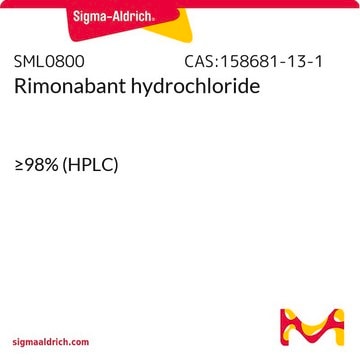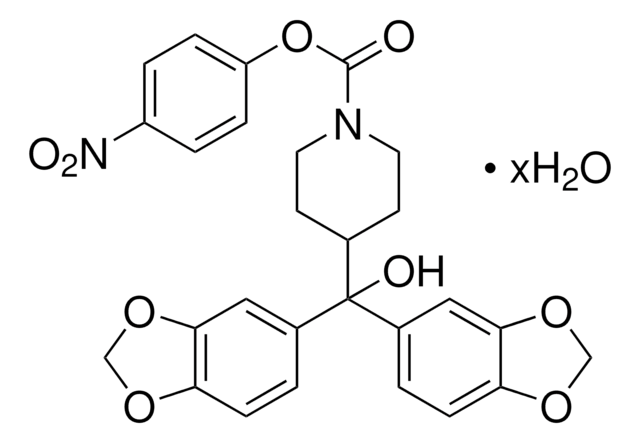A8973
2-Arachidonyl glycerol
~10 mg/mL, ≥98% (HPLC)
Synonym(s):
(all-Z)-5,8,11,14-Eicosatetraenoic acid 2-hydroxy-1-(hydroxymethyl)ethyl ester, 2-AG, 2-Arachidonoylglycerol, 2-Monoarachidonoylglycerol
About This Item
Recommended Products
description
9:1 mixture of 2-AG and 1-AG
Assay
≥98% (HPLC)
form
solution
drug control
regulated under CDSA - not available from Sigma-Aldrich Canada
concentration
~10 mg/mL
shipped in
wet ice
storage temp.
−20°C
SMILES string
[H]C(CO)(OC(CCC/C=C\C/C=C\C/C=C\C/C=C\CCCCC)=O)CO
InChI
1S/C23H38O4/c1-2-3-4-5-6-7-8-9-10-11-12-13-14-15-16-17-18-19-23(26)27-22(20-24)21-25/h6-7,9-10,12-13,15-16,22,24-25H,2-5,8,11,14,17-21H2,1H3/b7-6-,10-9-,13-12-,16-15-
InChI key
RCRCTBLIHCHWDZ-DOFZRALJSA-N
Gene Information
human ... FAAH(2166)
rat ... Cnr1(25248) , Cnr2(57302)
Looking for similar products? Visit Product Comparison Guide
Biochem/physiol Actions
Caution
Physical form
Signal Word
Danger
Hazard Statements
Precautionary Statements
Hazard Classifications
Acute Tox. 4 Dermal - Acute Tox. 4 Inhalation - Acute Tox. 4 Oral - Eye Irrit. 2 - Flam. Liq. 2
Storage Class Code
3 - Flammable liquids
WGK
WGK 2
Flash Point(F)
35.6 °F - closed cup
Flash Point(C)
2 °C - closed cup
Personal Protective Equipment
Certificates of Analysis (COA)
Search for Certificates of Analysis (COA) by entering the products Lot/Batch Number. Lot and Batch Numbers can be found on a product’s label following the words ‘Lot’ or ‘Batch’.
Already Own This Product?
Find documentation for the products that you have recently purchased in the Document Library.
Customers Also Viewed
Related Content
ZipTip® micro-SPE pipette tips are used as a single-step desalting, concentration, and purification tool for complex samples before mass spec analyses.
ZipTip® micro-SPE pipette tips are used as a single-step desalting, concentration, and purification tool for complex samples before mass spec analyses.
ZipTip® micro-SPE pipette tips are used as a single-step desalting, concentration, and purification tool for complex samples before mass spec analyses.
ZipTip® micro-SPE pipette tips are used as a single-step desalting, concentration, and purification tool for complex samples before mass spec analyses.
Our team of scientists has experience in all areas of research including Life Science, Material Science, Chemical Synthesis, Chromatography, Analytical and many others.
Contact Technical Service

















